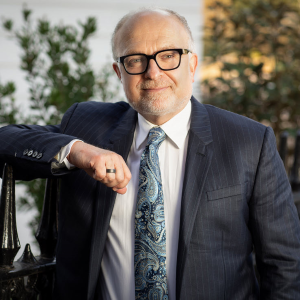People in most of the world are living longer than ever before. That should be cause for celebration, yet much of the talk about aging societies focuses on unfunded pensions, strained health care systems, and slower gains in living standards.
Where others see problems ahead, Andrew J. Scott sees opportunity — if we adopt the mindset to seize it. Scott, director of economics at the Ellison Institute of Technology in Oxford and author of “The Longevity Imperative,” says all people, young and old, need to think about how to live longer, healthier, and productive lives, with government and business playing a major enabling role. “Whatever your age,” he says, “you’ve got more time ahead of you.”
Scott spoke recently to Rupal Kantaria, a London-based partner of the Oliver Wyman Forum.
Why do all of us, young and old, need to think about longevity in a different way?
It’s one of these big trends, like AI and climate change, that’s going to determine our future. It’s incredibly important but often neglected because aging is always seen as a negative. There's a pensions crisis, a health crisis. That's a weird way of looking at one of the greatest achievements of the 20th century — an increase in life expectancy.
When my father was born in 1925, he had a 50% chance of making it to 65. A child born today has a more than 50% chance of living to 90. The trouble is our institutions aren't set up for that length of life. We've got to change everything — our culture, our attitudes, our education system, our financial system, and our careers and the type of jobs we do.
I love the way you talk about longevity in the context of AI and climate change because for a while people didn't think those issues affected them personally. Do you see that as a challenge for longevity?
One of the reasons it gets neglected compared to AI and climate change is the steady, slower nature of longevity. It's also seen as being about death, end of life decline, care homes, and adult diapers. What people don’t understand is this is about your life.
Today’s norms were based around a life expectancy of 60 or 70. That's all changing. We're seeing people work for longer, start work later, take mid-career breaks. We've got to find the solutions to show people the way because it's very hard at 18 to say, gosh, this is what I need to do when I'm 90. This is a really big social experiment which affects every part of life.
You talk about a longevity dividend. What does that mean?
Every country is seeing a shift in its population structure; birth rates are declining, and life expectancy is increasing. If we invest in our human capital over the later parts of our life, we get a dividend. The simplest way to put it is, you’ve got more time. What do you want to do with that time?
For the UK economy, about 80% of people are working at age 50. By 65, which is two years before the state pension age, it's down to about 25%. If you could halve that rate of decline, you would get a 4% boost to GDP every single year. And this is not about raising the state pension age. It's just helping people not leave the labor market. That's quite an economic dividend.
There's no shortage of headlines around rising National Health Service (NHS) waiting lists. How can we shift the focus from disease to prevention?
Health systems aren’t really about health. They’re obsessed with disease. And now that life expectancy in many countries is 80 and above, we’ve seen a shift in the disease burden away from infectious diseases toward chronic diseases. Once you get diabetes, your chances of getting a cardiovascular problem or dementia will increase. So, we've got to shift much, much earlier to focusing on health.
Prevention is starting to become possible. We understand the development of disease a lot more. GLP-1 drugs are an interesting example because by reducing one factor, obesity, you seem to have an effect upon multiple diseases, which is a really exciting way of trying to do prevention. We’re also getting more and more data. If you've got data on people's genetic susceptibility to disease, you can target particular areas for prevention.
Watch the conversation:
What other factors can contribute to living longer, healthier lives?
About 80% of how we age is our behavior and our environment. It's about the air that we breathe, the houses we live in. It's about a public transport system that makes us do a little bit of mobility. It's about the food and drink that we buy. The health system starts to migrate way outside hospitals and doctors when you're really thinking about prevention.
What about looking to Eastern philosophy and health care that traditionally focused on wellness?
There's a lovely quote by W.H. Auden, the English poet, that says health is the thing that medicine knows nothing about. That’s very much about Western medicine, which says, give me a disease, I'll give you a diagnosis.
When you look at the literature about what makes people live long, healthy lives, they don't start with a medical system. Every research study now says the things that give you a long, healthy life are having a sense of purpose, a sense of community, sleeping well, eating well, not being stressed. There are lots of countries at the frontier of medical technology that have long emphasized that.
You started by saying longevity is an individual thing. What should I, as a 45-year-old woman, be thinking about?
First, however old you are, you've got to do things differently from your parents’ generation because you have more time than they did. And as a woman, how you get through menopause has a really big influence on later health.
Making sure you’ve got optionality in terms of your work is really important. Lots of people say, “I’m fine, I can get by until I'm 65.” But the older you get, the more likely it is that you're the ones who get kicked out of the workforce for all sorts of reasons, including ageism. Also, if you're going to be working into your early 70s, you've got 27 years of your career ahead of you. How do you keep fresh? What you learned at college is probably not going to get you through to the rest of your career. So, you’ve got to think about those new skills.
What is the longevity opportunity for companies?
We underestimate the capacity of older people, which is why we're negative about an aging society. That's a major problem because in Britain, most of the growth in employment comes from workers over 50. Yet most firms just look at younger workers.
I'm a big believer in age-friendly jobs. What tends to happen as you get older is you want a different type of job, something that's less physically demanding. So robotics is supporting an older workforce in manufacturing in South Korea and Japan.
Older workers want more flexible workplace practices, more autonomy. If you can create those kinds of roles, you can enable them to work longer for you and create promotion opportunities for younger workers coming through.


